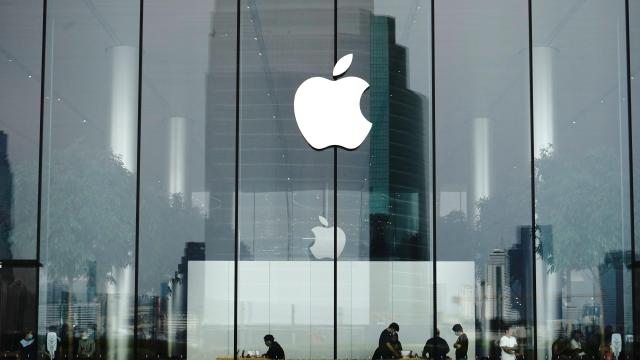Apple, one of the internet’s largest toll booths, wants to make damn sure it’s getting its cut of NFT purchases made on The App Store.
The company adjusted its App Stores rules around cryptocurrency and NFT services listed on the platform this week, making clear users must purchase NFTs through Apple’s in-app payment system. The new rules clarify app makers can let users view, list, mint or transfer NFTs but prohibits them from unlocking additional features or functionality on the app, which some suggest could be used as a workaround to Apple’s payment system. More importantly, the rules prohibit app makers from using features, such as links, to draw users to a non-Apple payment methods.
“The apps may not include buttons, external links, or other calls to action that direct customers to purchasing mechanisms other than in-app purchase,” the new rules read.
Apple’s apparent rationale for the language adjustment here seems pretty straightforward. The company generally receives a 30% commission — though that’s lowered to 15% for smaller users — on all transactions made through its platform. In the past, and in front of Congress, Apple has argued these commissions are necessary to keep and maintain safety and security on its platforms. Developers like Epic and Spotify and a growing chorus of lawmakers around the world have called bullshit on that argument and have filed lawsuits and proposed legislation accusing the company of monopolistic practices.
News of Apple’s NFT changes rattled more than a few feathers amongst developers and Web3 promoters.
Interesting. Seems like Apple is potentially aiming to cut off Reddit and other using NFTs as a workaround for their store.
As much as I love Apple, I’m bigger on antitrust, and this is just building the case against some of their App Store approaches imo. https://t.co/LLk4XWFrCc
— Collins Belton (@collins_belton) October 24, 2022
Make no mistake about it – Apple is now the largest threat to Web3 with their most recent App Store Guidelines that they published today. Apps Are Bullshit Part Deux. A thread below on the implications this has for Web3 & Crypto 🧵
— Jason L. Baptiste | jasonlbaptiste.find (@JasonLBaptiste) October 24, 2022
Wow. Apple now requires 30% of a user (consumer or business) purchase of a promoted post (e.g. sponsored Tweet or Facebook post) as long as it’s placed in the app (versus, say, booting up a browser dashboard or moving to the network’s advertiser apps) https://t.co/S4BV27WRS4
— Matthew Ball (@ballmatthew) October 24, 2022
Others, like Epic CEO Tim Sweeney, who’s led lawsuits against Apple’s app store practices in the past, compared the new rules to a cash grab.
“To cryptocurrency enthusiasts, this means Apple is now adding a 30% tax on your so-called ‘true ownership’ of digital goods,” Sweeney wrote on Twitter. “To cryptocurrency detractors, this shows Apple’s motivations are only money. For digital items, they support NFTs they tax, and ban NFTs they don’t tax.”
To cryptocurrency enthusiasts, this means Apple is now adding a 30% tax on your so-called “true ownership” of digital goods.
To crytocurrency detractors, this shows Apple’s motivations are only money. For digital items, they support NFTs they tax, and ban NFTs they don’t tax. https://t.co/RWZC1rSUwh
— Tim Sweeney (@TimSweeneyEpic) October 24, 2022
“It’s quite shocking that, in the presence of antitrust lawsuits and greatly increased legislative and regulatory scrutiny, Apple’s doubling down on brazen monopoly rent seeking,” Sweeney added.
Apple did not immediately respond to Gizmodo’s request for comment.
Apple’s NFT rules will only add insult to injury to a rattled NFT ecosystem that’s seen its trading volume radically decline compared to its 2021 highs due to shellshocked cryptocurrency prices and a wobbly economy generally. An analysis conducted last month by Bloomberg found NFT trading volume had dropped off 97% from their record high in January this year.
Apple’s new rules were comparatively more lax when it comes to cryptocurrency exchanges. The company clarified that apps can “facilitate transactions or transmissions of cryptocurrency on an approved exchange,” so long as those services are only offered in regions or countries where that app has appropriate licenses. That last addition though, as TechCrunch notes, does mean Apple now potentially has the cover to remove certain crypto exchanges from local App Stores if they believe those exchanges are operating illegally.
